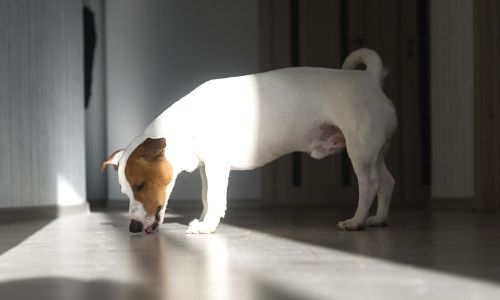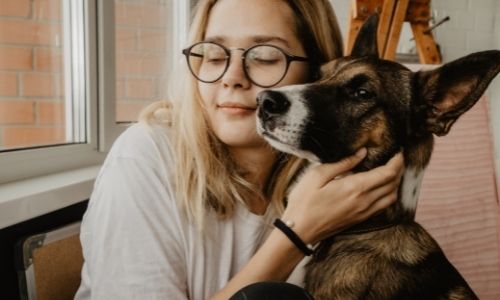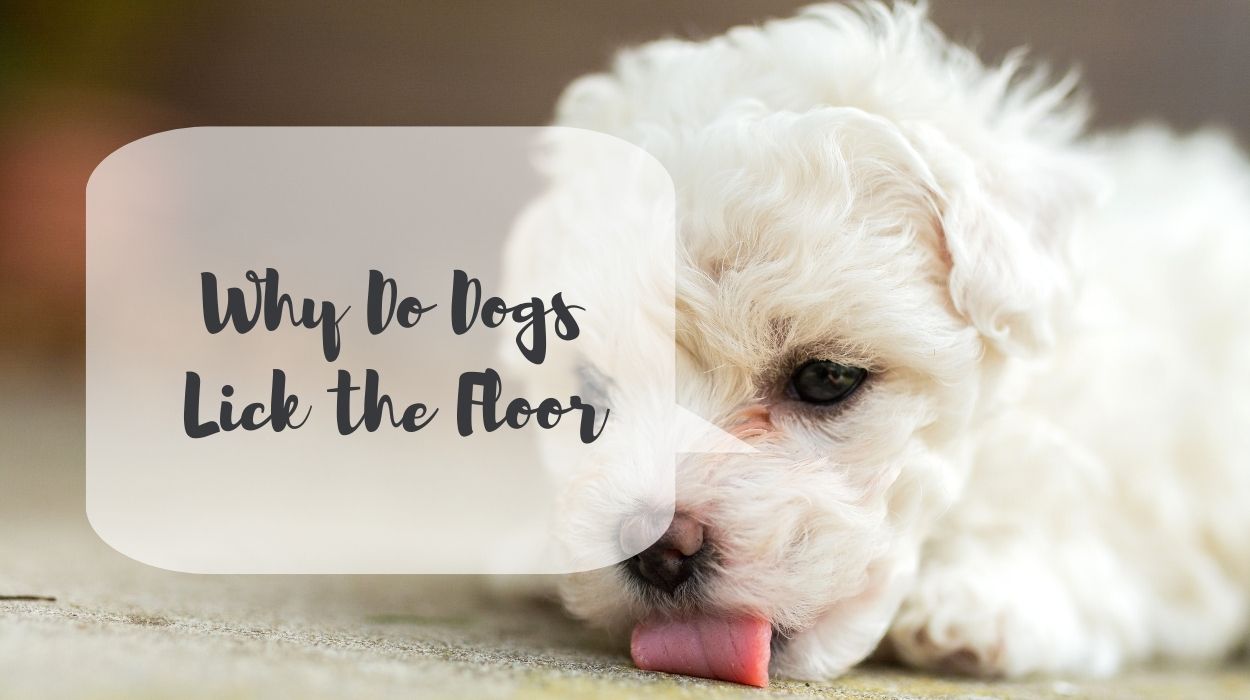Dog owners must have been accustomed to their dogs licking the floor, but is this a safe habit? Are you one of those pet parents who have tried almost everything but your dog won’t quit this habit, even feeding more, giving expensive toys don’t work?
Moreover, is it due to hunger, boredom, anxiety? Or even worse, dogs lick the floor and throw up!
There are various reasons behind it, which can be physical or mental.
This article will help find the root cause behind this behavior, how to stop it, and when to see the vet! Keep reading!
13 Reasons Why Yous Dog Lick the Floor?

In our minds, we picture dogs with their tongues out 99% of the time; that’s because it plays a significant role. Usually, when a dog licks you, it represents affection, but something is fishy when a dog licks the floor!
Such behavior occasionally is acceptable, but if they’re licking obsessively, reasons can be the following:
1. Acid reflux
Acid reflux is also known as a GI problem occurs when the mix of acids, salts, and bile moves into the esophagus from the stomach. You can understand the discomfort of your dog in a much better sense because acid reflux in dogs and humans is the same.
To find comfort, your dog will lick the floor or his lips.
Dogs are prone to GI distress on occasion. When their stomachs are empty, dogs feel nauseous and vomit foam or bile.
Most dog owners have witnessed their dogs licking the floor in the morning, so if your dog also has additional instances of early morning licking/vomiting, you should start giving them a small amount of food before night.
2. Your dogs getting old!
Old dogs have a habit to lick the floors, does not matter if It’s made up of wood or tiles, they will lick compulsively. It’s a dietary thing, old dogs tend to eat and drink less than what they used to before!
Old dogs even get attracted to licking the dirt! Dogs crave plant-based enzymes to digest their food and when it’s lacking in their diet they will not depend on you but would find a way on their own, apart from this dementia in dogs, physical discomfort, and neurological issues are all possibilities.
3. Issues With the Teeth & Mouth
If you catch your dog licking the floor right after he had meat or any such food that has chances of getting stuck in the mouth, check your dog’s teeth.
Dogs don’t have fingers to slip inside their mouth and remove what’s bothering them, and it can also cause more drooling than usual; dogs try to remove the excessive drool by licking.
Red or swollen gums are a sign that your dog is having trouble with it; however, do not try to treat it yourself, instead take your dog to the vet.
In some cases, there’s something stuck in your dogs’ throat that is making him feel uneasy. To eliminate this nausea sensation, the urge to puke can make your dog lick the floor.
4. Anxiety
Some people habit chewing their nails when they are anxious, it doesn’t matter how irrelevant and disgusting it looks, but they use it as a coping mechanism in a stressful situation!
Dogs are no different from us, and they can develop anxiety and have other ways to cope with it; licking the floor is one of them.
So if you see your dog licking the floor once or twice in the gloom, then it’s OK because come on, they are dogs, and they love to lick and roll in doggy bliss.
If you see them doing it now and then, your dog engages in Repetitive or compulsive actions to deal with the anxiety.
So, your dog is licking the floor because he has anxiety; what makes him feel so anxious? It can be due to fear, separation, or age-related anxiety!
Fear anxiety: our poor babies are not just scared of thunderstorms and rains; other things trigger their fear.
For example, you have a beagle and your neighbor recently welcomed a rottweiler in their house, dogs can smell the fear and will act up. Other things that scare your dog are loud noises, drastic environmental changes, strangers, car rides, etc.
Age-related anxiety: when your dog starts getting older, he might develop CDS (cognitive dysfunction syndrome). Your dog will probably forget how to perform basic activities. The confusion in dogs leads to anxiety.
Separation anxiety: our dog’s world literally revolves around us, and sometimes they can’t deal with the separation from their favorite human. Then you are not around for your dog, and they might engage in destructive, undesirable, and repetitive behavior to deal with such anxiety.
Apart from the behavior changes, your dog might display anxiety with his eyes wide open, lifted ears, and barking on the slightest noise, visible signs that your dog is anxious.
So now you know the cause of anxiety in your dog; you can calm them down quickly, but if you leave it untreated, then your dog might develop an anxiety disorder.
5. Lack of nutrition in your dog’s diet
Dogs love three things the most, humans, food, and cuddles, lots and lots of cuddles! So if anyone from it goes missing, your pet’s behavior can get affected.
Amino acids from proteins, fatty acids, carbohydrates, vitamins, minerals, and water are some nutrition your puppy needs to survive.
They require a certain amount of energy to carry out their daily activities. Growth, pregnancy, breastfeeding, and exercise increase these energy requirements.
Generally measured in terms of calories, power comes from three major dietary components: carbohydrates, protein, and fats.
Carbohydrates, protein, and fats are essential for your dogs to gain power.
Your dog requires minerals, calcium, phosphorus, and nutrients to have solid teeth and bones.
Nerve impulse transmission, muscular contraction, and cell signaling need magnesium, potassium, and sodium in dogs.
Any of these goes missing from your dog’s diet, and they will start looking for it on their own!
6. Gastrointestinal Disorders
A study showed that there’s a direct correlation between gastrointestinal disorder and your dog licking the floor; as such, stomach issues can trigger ELS(excessive licking of the surface)
By observing your pet’s symptoms, you can often determine the nature and location of the illness; for example, abnormal biting, chewing, and swallowing usually indicate a problem with the mouth, the teeth, the jaw, or the esophagus.
So the bottom line is that if your dog is excessively licking the floor or carpet, it indicates that he’s suffering from stomach issues!
To assure that your dog is licking the floor due to gastrointestinal disorder, watch out for other symptoms such as diarrhea, constipation, vomiting, excessive drooling, bleeding, bloating, straining while pooping, etc.
These are the signs that your dog is suffering from digestive diseases.
7. Is your dog on steroids?
When a dog is on a particular medication, the side effects include frequent urination, increased thirst, and hunger! There’s a correlation between hunger and licking the floor or the carpet.
So, if your dogs are on some common steroids, like Prednisone, and you catch them licking the floor or even eating the fibers from the carpet. This might be due to hunger! You can report this as a side effect of medicine to your vet.
8. Your dog is bored!
Dogs have numerous ways to keep themselves entertained if their human fails to do so! It is possible that your dog got tired from chasing the birds, barking at the windows, and circling its tail now, the next resort is sitting down, and he’s licking the floor so that he could also have some rest. These are signs that your dog is not getting enough playtime, and he’s finding other ways to release its energy.
9. Neurological Disorders
The brain is a complex organ that controls memories, emotions, touch, motor skills, vision, breathing, hunger, etc. Any disturbance in the primary central nervous system can result in a neurological disorder.
If your dog is suffering from a neurological disorder, it’s so likely for him to get involved in repetitive and impulsive behavior such as licking the floor.
Seizures can trigger your dog to lick the floor uncontrollably, as it only affects certain body parts, but if you can call your dog and stop this behavior by hearing his name, it is not a seizure, says the vet.
Dogs with brain tumors, hydrocephalus, partial motor seizures, limbic epilepsy, etc., can exhibit such odd behaviors.
10. Pica
If you hear about Coprophagia in dogs, you would be so thankful to your dog for licking the floor! Well just joking.
In pica, your dog not only licks the floor but also eats objects like carpet fiber, splinters, or baseboard fragments.
There are such conditions dogs suffer from in which they are attracted to eating non-food items.
Now we all know that dogs have a habit of licking anything; no matter how dirty you are, they will lick you up in the name of affection, so basically, licking is a very usual behavior of dogs.
The usual behavior of licking takes no time to turn into a disorder, and initially, it will start with your dog licking things like dirty socks, underwear, towel, rocks, grass, etc.
If you somehow fail to address this issue within no time, you will find your dog licking more.
Numerous reasons can cause pica in your dog; sometimes, understating that your dog is suffering from it is not as tricky as finding the cause. Hunger, hormonal imbalance, nutritional imbalance, diseases such as diabetes play a significant role in contributing to it.
Your vet can help you find out the root cause of the pica in your dogs.
Pica can also result from emotional issues because when you don’t take proper care of your dog’s mental and physical needs, he will engage in compulsive and repetitive behaviors.
So watch out for both!
11. Polyphagia
If your dog is one of those who would act like they are starving even after you have fed them for the 100th time, then the act of floor licking could be due to Polyphagia. Older dogs are more inclined towards suffering from Polyphagia.
Polyphagia in dogs can be due to an underlying condition or behavior problems.
However, If the motive for the excessive ingesting is because of pressure, anxiety, or behavioral troubles, the veterinarian can also refer you to an animal behaviorist.
12. Your dog can be suffering from behavior issues
Dogs are like human kids; if you discipline them, they will behave, but if you don’t, they will cause trouble, and later on, it becomes a behavior pattern, a wrong way to get things done!
So if you did nothing when your dog was licking the floor or other inappropriate things, this ignorant behavior has somehow taught your dog that there’s nothing wrong in it, and it grows out to be more prominent and recurring.
If you cannot give proper time to your dog, your dog will lick the floor to grab your attention, and positive reinforcement will not be preferred over negative reinforcement.
13. Did you drop a tasty treat on the floor?
Do you remember how your dog used to lick off the treats from the floor as a pup? Even after globing up the treat, he would continue licking that specific area!
Almost every dog owner can relate to it; even if there’s a single crumb of food, your dog will not spare it.
That’s because dogs have excellent smelling sense, so if you drop a little piece of food on the ground, your dog will automatically clean it with its tongue.
Why your sick dog is licking the floor?

If your dog has an upset stomach, he will lick the floor to settle their upset stomach. Yes, you heard it right; dogs can feel the urge to induce vomit if they feel uneasy. This habit is also found in pups, but they would eat some grass instead of the floor!
Your dog is not alone in this; they purposely lick the floor and throw up to eliminate the uneasiness they are experiencing.
Sometimes it can be undigested food, feeling gassy, the taste of medicine, undesirable food, or even a foul smell that can make your dog sick and want to puke for some relief.
If you see that your wise dog has recently started licking the floor, keep an eye on him.
4 Effective Ways To Stop Your Dog From Licking The Floor

Sometimes, dogs licking the bottom is normal unless it is not compulsive or obsessive. If you find your dogs falling victim to this habit, it’s time to correct them. These simple solutions will prevent your dog from licking the floor.
1. Treat the health problems.
There are mainly two reasons for your dog to get involved in such weird activities, and it can be due to a medical condition or behavior problem.
Many such diseases will trigger your dog to lick the floor, and you need to detect them for proper treatment.
In such less severe issues, why and when is also important to determine, if your dog is licking the floor before bedtime and early morning, then it can be due to the acid flux in the stomach being empty; in such cases, the vet would suggest a bedtime snack for your dog and the concern will get cured!
You should record your dog while he’s busy licking the floor and show it to the vet to understand better.
Apart from these, some mid-level health issues, like pica and Polyphagia, would require a dietary change.
2. Changing Environmental Conditions
Dogs suffering from anxiety and stress would get involved in floor licking behavior to soothe themselves, and the environment directly impacts your dog’s wellbeing.
However, the best part is curing it with some simple environmental changes.
As we discussed above, dogs can get stressed or anxious due to three things, separation, fear, or boredom. Identify it and work accordingly.
It can be anything, a new dog in the neighborhood, a new family member, loud noises coming from the roadside, etc.
Here are five types of environmental enrichment for dogs
- Cognitive enrichment: mental stimulation promote cognition through scenarios and problem-solving games.
- Social enrichment: interaction with other dogs and humans.
- Sensory enrichment: your dog’s senses of smell, hearing, touch, sight, and taste being stimulated with smell, images, texture, and sounds.
- Physical enrichment: generate greater interest and motivation in your dog’s surroundings by using a physical object.
- Nutritional enrichment: focus on improving the wellbeing of your buddy by amending how they eat the food.
By implying this in your dogs’ lifestyle, you can improve your dog’s life, and eventually, the negative habits will disappear.
3. Behavior Modification Training
Behavior modification training is necessary for dogs with anxiety issues, and even your vet will suggest a combination of movement, preventive strategies, and in some cases, medications.
Let’s have a look at some popular behavior modification training methods:
- Counter conditioning: in this method, you can change your dog’s emotional responses to their triggers; in short, it is the key to reducing your dog’s floor licking habit with positive things like treats and praises, so your dog will learn to feel relaxed and calm instead of agitated.
- Desensitization: if you know the source of your dog’s anxiety, you need to introduce him slowly to it. Regularly exposing your dog to its fear and praising positive behavior can help you feel less anxious.
- Drugs that affect serotonin absorption: Studies show that dogs with OCD have altered serotonin levels, so medicines that affect serotonin absorption may help reduce some behaviors.
4. Improve the feeding practices of your dog
Your dog’s nutritional needs will vary depending on its size, breed, and life stage, among other things. Understanding how dogs utilize different nutrients in food and how much of each they require will assist you in selecting a healthy diet for your pet.
- All the necessary amino acids are well-balanced in high-quality proteins—beef, duck, chicken, Salomon, rabbit, pork, etc.
- Essential fatty acids are required for your dog’s skin and coat to remain healthy– these fats can be found in animal fats and seed oils from different plants, sunflower oil, soybean oil, flaxseed, canola oils, etc.
- Energy requires: Cereals, legumes, and other plant foods are the primary sources of carbs in commercial dog diets, apart from that, corn, rice, potatoes, Barley, whole-grain bread, and other grains.
Vitamins:
Vitamin B: Beef, liver, milk, egg, chicken, oats, green veggies.
Vitamin A: Carrots, spinach, liver, pumpkin, sweet potatoes, fish oil, eggs, turnip greens
Vitamin D: Marine fish oil, fatty fish, egg yolks, dairy products, liver, beef, cottage cheese
Vitamin E: Plant oils, leafy green vegetables, seeds, wheat germ, bran, whole grains, liver
Vitamin K: Liver, leafy green vegetables, milk, cabbage, fish
Since now, you know the nutrition required for your dogs, you can go through the Pet food labels and choose the wise option available for your breed.
Note: When reading labels, remember that what appears to be a significant difference in nutrient amounts—for example, 9% protein in canned dog food vs. 29% protein in dry dog food—is because the canned food contains more water.
Conclusion:
It can be so frustrating to see your dog wetting the floor with his saliva, but what could be more frustrating is to break this habit. With the help of our article, you can first detect the reason behind this behavior and then work on it in simple and effective ways!
Both the behavior and health issues can contribute to developing this habit. Always remember that dogs lick the floor occasionally; that’s fine, but if your dog is licking the floor day and night, you should take them to the vet.

Dr. Aram Baker has been with Santa Clarita Animal Hospital since 1995 and his special interests include behaviour medicine and dermatology. He graduated from the Cleveland Humanities Magnet Program in Reseda, CA and attended California State University at Northridge where he received a Bachelor’s degree in biology. He went on to pursue his Doctorate in Veterinary Medicine at the University of California at Davis. He also spent time in the zoological medicine department at U.C. Davis during his Junior and Senior years. He is dedicated to caring for all pets big or small, young or old with compassion, patience, kindness, and love.
